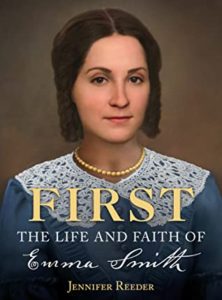 Review
Review
Title: First: The Life and Faith of Emma Smith
Author: Jennifer Reeder
Publisher: Deseret Book
Genre: History
Year Published: 2021
Number of Pages: 224
Reviewed by Erin Cowles
I love Jennifer Reeder as a historian. Her research is solid and careful, she works very hard to avoid presentism, and she formats her writing in interesting ways to make it accessible and highly usable by the lay reader.
This book is a very different book than Newell and Avery’s Mormon Enigma. If you’re looking for the definitive book on Emma Smith, Reeder is not going to unseat it, for better or worse. That said, it does offer many things that Mormon Enigma does not, and I argue it is an important addition to the canon.
Reeder is a lot more rigorous with her sources than Newell and Avery. Emma Smith is a very hard subject for a biographer because she left so few materials in her own hand. No journals, no autobiographical sketches for newspapers – just a handful of letters that have survived, and a priesthood blessing that she wrote for Joseph to give her (at his request). Everything else is transcripts of speeches she gave, historical documents, and other people’s writings about her. Reeder was much less willing to use second- or third-hand sources than Newell and Avery, which makes for a far less robust volume, but one that feels less gossipy, for lack of a better word. It gives the book a more detached and impersonal tone, but I felt a greater trust for the sources that she included.
She also organizes her work in a radically different way than a traditional biography. It is not chronological. It is organized by ten important currents that ran through her life, and gives the arc of how those values and roles impacted her life and her understanding of self. While it led to plenty of redundancy when contextualizing the chapters’ events, it allowed us to see trends that would have been harder to see when interspersed with all the events that happened in the middle, and I think this was highly valuable.
Also, the average member of the Church of Jesus Christ of Latter-day Saints is not likely to pick up a 400+ page historical work, but this is a lean 180ish pages, with a lot of endnotes included at the end of each chapter within those 180 pages. Because of her topical format, she does assume the reader has a basic gist of Smith’s life story and church history, so a reader without any exposure to this history would struggle with this volume. However, as long as you have that basic framework, this is a really fast read. We so desperately need rigorous research from our history written in a way that the average member is actually willing to read it, and Reeder delivers. Further, the Deseret Book stamp of approval will put it in hands that wouldn’t feel comfortable with other publishers.
Now, for the elephant in the room. You really can’t talk about an Emma Smith biography without talking about its treatment of polygamy, because it shaped so much of her story. And this is where it gets complicated, because Nauvoo polygamy was so secretive, it is hard to find evidence that would meet Reeder’s rigorous standards for what is historically trustworthy to include, as well as what portions of our current knowledge Emma would have had access to. Joseph hid so much from her, and she maintained through most of her life that Joseph Smith was not polygamous (despite plenty of historical evidence that she knew about it in part), so it is tricky to pin down what exactly she knew. The book doesn’t shy away from polygamy. It impacted many facets of Emma’s life, so it made an appearance in many of the chapters. Reeder’s tone was very no-nonsense about it, and she didn’t hesitate to include the unpleasant bits about things beloved historical figures did, and how hurt Emma felt by these actions. That said, I do feel like Reeder included the bare minimum she could get away with talking about. I felt far less angry reading this than I have other books that discuss his polygamy. That said, this is a book about Emma and her contributions, not about Joseph, and I think Reeder did include enough for us to understand how Joseph’s polygamy impacted her decisions.
Overall, this was well-researched and highly readable, and I loved that it allowed Emma and early church members to be messy and complicated while still showing Emma’s strength, and celebrating her resilience and contributions to the church. I think Smith would be pleased with how her story was told.
